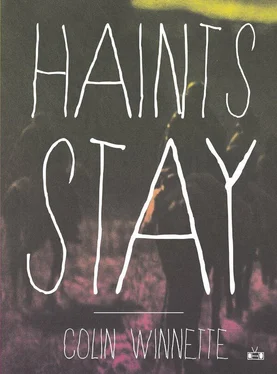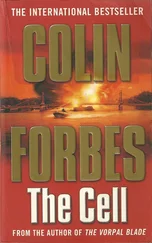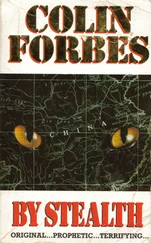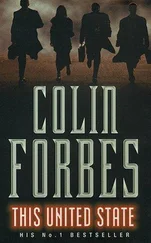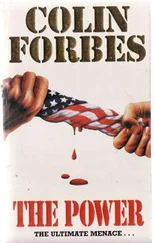Or so he’d expected. And then she’d appeared, on the horizon, moving slowly toward him. He hadn’t even realized that he was collapsed until she was at his side and encouraging him to sit up, to drink and open his eyes. She was weeping as if it moved her to see him like this. As if she’d known him. She had something sick within her. Her eyes were not warm, but nearly white, like those of a fish. She twisted water from the ends of her sleeves and the tail of her shirt and washed his face and the inside of his mouth. Her touch was not loving, not yet, but was confident and familiar, as if she’d made a life of rescuing half-dead men from the wilderness.
“Are you lost?” she said.
She held him in her lap. The snow fell steadily.
He nodded.
“I am lost too,” she said.
He nodded. When he woke, she had his back propped against her front. His legs were in the snow, sunk to the bottom and greeting the sand down below them. She had spread out a blanket beneath her. It dipped toward the center where she sat, and was slowly filling with snow. You could not see the sky. Only the sun and the thick, broken snow, as if it were falling directly from heaven. The wind picked up and moved the snow around and then it seemed to be coming directly from the earth, spiraling up and around and holding them there.
“You fell asleep,” she said.
He nodded.
It was more than likely that he had died. That this woman was an angel or some creature made entirely of death. He could hardly feel how cold it looked. He could not make sense of where he’d been and where he was now.
“It wasn’t snowing only a few days before,” he said.
“It was not snowing when I set out,” she said.
“What were you after?” he said.
“A baby,” she said.
“Whose baby?” he said.
“I do not know,” she said.
He did not press her anymore. He wanted her to continue, but was not sure when her sickness would expose itself. There was something wrong in her, and he did not want to face it. He had no defenses and was enjoying her warmth and company.
“Are you married?” he said.
“I was,” she said.
She leaned into him, to warm or to quiet him. Her hair smelled rotten, like death and sweat. Her fingernails were stained through with crud. She had dirt in the cracks of her knuckles. Scratches on her face and neck. Something about her was incredibly beautiful to him.
“You’ve been through hell,” he said, and she did not respond.
When the windows were fully covered, there was no clear way to determine the weather. They knew it was cold, so they knew that the snow had not melted and was not melting. They knew they were running low on logs and chairs and tables for the fire. They were not running low on food, and water could be made from the snow easily enough. They had a small pouch of bullets that Bird had acquired from the homes he’d broken into when retrieving the bodies. So he did not fire the gun when he practiced his aim. He merely practiced keeping the pistol steady. His single arm extended, he would shut an eye and attach the barrel of his gun to some small item on the room’s far wall. He would hold steady, count to see how long he held, and begin again every time the barrel shifted or his breath drew him out of alignment. Mary did not much like the game, and told him so repeatedly. But he did not stop.
He explored the second floor and found magazines and adventure books in a trunk beneath one of the beds. He brought them down with the thread from before. He taught himself to thread a needle with a single hand, using his knees and wetting the string with his mouth to keep it stable and pointed. He believed this would help him with his aim, in the long run. He asked Mary to read the magazines and adventure books aloud to him.
“Men are not like that,” said Bird.
“You do not know all the men in the world,” said Mary.
“Women are not like that,” said Bird.
“With that,” said Mary, “I can agree.”
Bird began to work on his speed. He tucked the pistol into a pocket and withdrew it as quickly as possible. Often, it fell. Once, it went off. Snow came in through the fresh hole in the window. Mary took the gun and unloaded it. She demanded the bullets from his pouch. They were getting along as well as they ever had.
Mary did not like the books at first. She said they lacked the right kind of description, and they did not conclude in a high-minded way. But while Bird was practicing with his pistol, she had little else to do other than read and reread them. She was not interested in pistols. She was not willing to cook any more than he was, and so they prepared nothing more than they had to. She did not like to explore upstairs. She tinkered at the piano, but produced no sounds that pleased her. It needed tuning. She had never been a pianist, and now it made her think too much of Martha, and of how long they had been there, and of how long they could be stuck. But they were not stuck, it was important to remember. They could tunnel out. They would tunnel out. Or the snow would melt. We will not die like this , she told herself.
“Do you think, when Martha returns, she’ll be able to find us?”
“She’s not coming back,” said Bird.
“But do you think we’re buried so far now that it looks only like a desert of snow? Can you even see the town as you approach?”
“How much snow could there be?”
“We are covered,” she said, “and who knows how high it goes?”
“It cannot go on forever,” said Bird. “It has to stop somewhere.”
He withdrew his pistol and held it steady. He placed it back behind his belt. He withdrew his pistol and held it steady. He placed it back behind his belt.
“Do you think the bodies will be as we left them?”
“No,” he said.
“You’ve grown cold,” she said.
“There is snow everywhere,” he said.
“Do you love me like a husband loves a wife?” she said.
“I don’t know,” he said.
“I feel like we are supposed to become husband and wife,” she said.
“Why?”
“Because we are here together and alone together and we get along and there is no one else.”
“There will be others someday,” he said.
“Do you really think so?” she said.
“Yes,” he said.
“I will be happy to see them,” she said.
“I won’t,” he said. “But I’ll be ready.”
It went on like this for longer than either of them realized. It was always dark, always cold. The fire gave them just enough heat and light to get by, but they didn’t allow themselves much more than that. There was no knowing how long they would have to keep it going.
They had no way of knowing for sure, which day the snow stopped. But suddenly water was running in through the hole in the window, and seeping in through the cracks in the wood and where the building’s joints were not flush or tight. It kept on like this and they soon realized that the snow was melting without pause. Which meant the sun was out. Which meant the days and nights were warming. Suddenly, the whole room would creak when Bird traveled up the stairs, so Mary made him promise to stop.
“All this snow came and held us here,” she said, “and now it’s going.”
She was smiling.
He nodded.
They slept on the two remaining tables to keep out of the damp. The floor was soggy. Their clothes would not dry. Their time in the building with the kitchen was nearly up.
Bird was the first to dig out, but only slightly. The snow outside was mere slush piled high, and little canals ran the water out into the wilderness around them. In every direction you could hear the sound of water running. He imagined himself a gunslinger, running the water out of town. He was able to get the door open, but not without letting in a considerable amount of slush. He was able then to dig a few inches out onto the porch. The snow level was near the roof now, but crumbling. Disappearing. Hightailing it. He took to the stairs though he had promised not to do so. He looked out the windows and could see the tops of trees again. He could see the tall rocks in the distance. He could smell the air the sun had touched. He could feel the sun as it broke through the glass. He followed its beam around the room. He wanted to get a sunburn. That was his goal. A sunburn on his single exposed arm. Or on his face and neck. He could feel it cooking him. He heard a fly buzzing at the window and almost burst into tears.
Читать дальше
